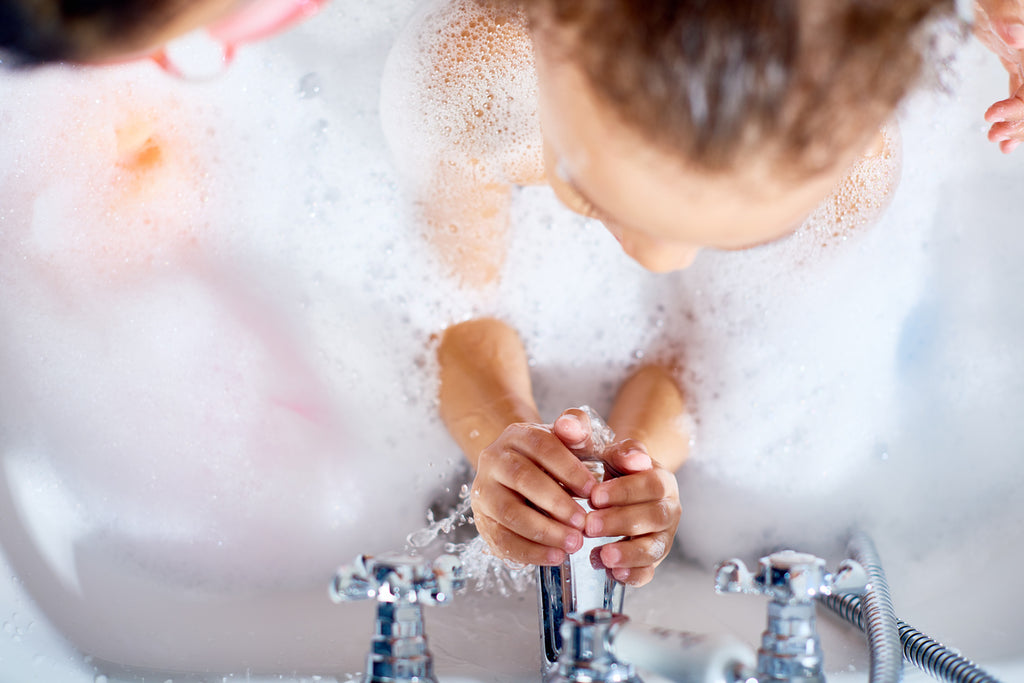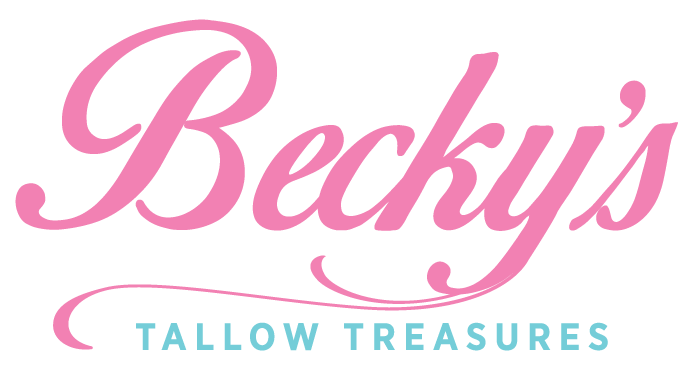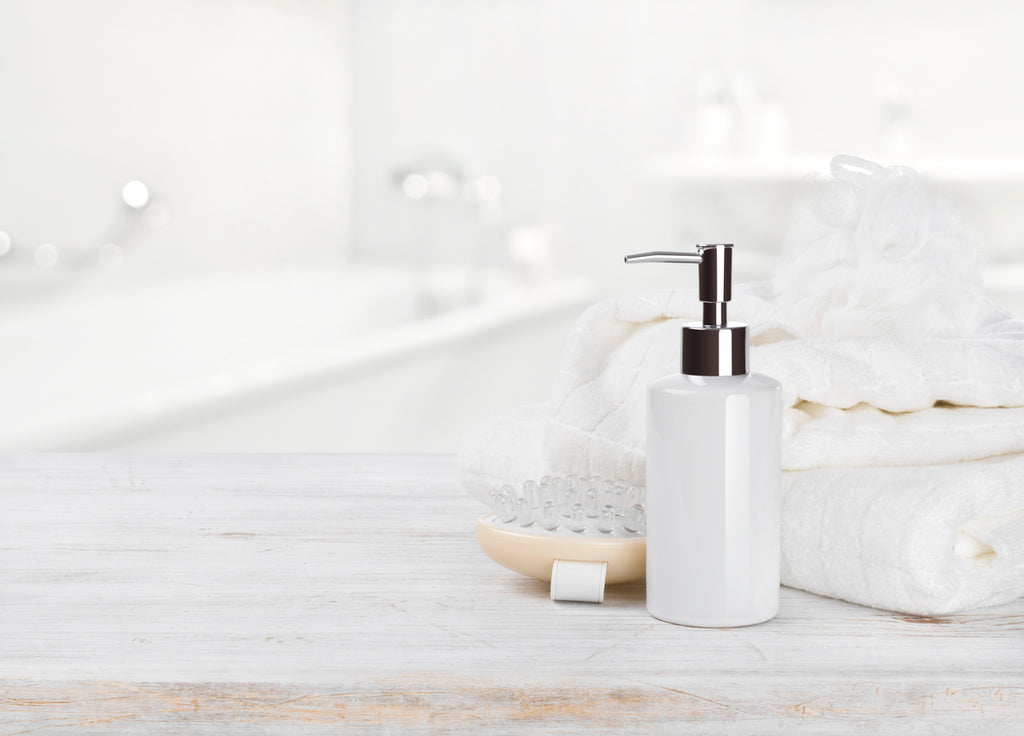A Child's Tears
No one likes to hear a child crying. Instinctively, we want to find out what's wrong, and do something to make it right. So when our son or daughter "makes a boo-boo" by splashing a bit of soap in their eyes while in their bath or shower, and then lets us know – through their tears – that this doesn't feel very good, we'll of course be motivated to find a way to prevent this from happening. We may be tempted, for instance, to purchase "tear-free" varieties of shampoo and soap. But is this really the healthiest choice, for ourselves and our children?
As every parent knows, a child's tears don't necessarily mean that something dangerous or unhealthy is happening. When you suggest to your son that the vegetables need to be eaten before the bowl of ice cream can be enjoyed, this may well cause his tear-gates to open -- in frustration at not being able to skip the main course and go directly to dessert. When you scoop your daughter up to prevent her from running into a busy street, she may cry out in protest that you've so unceremoniously interrupted her game of hide-and-seek. When you let your preschooler know that it's time for bed, he may cry in disappointment at not being able to keep watching his favorite cartoon on TV. But in each these cases, your adult wisdom rightly takes precedence over the more immature impulses of your child.
So what's the wisest choice, in relation to the soap we use to clean, nourish and protect our (and our children's) skin? Are "tear-free" or "pH-balanced" soaps really worth considering? Or is it best to stick with authentically made, natural, real soap, and just do our best to avoid getting it in our eyes -- and be glad for the wash of tears that occasionally are called upon to remedy our "boo-boos"?
The first step in answering this question is to learn a bit about pH – and how it relates to the health of our skin.
The Acid Mantle, pH Levels & Skin Care
The pH (short for "Potential Hydrogen") is a measure of the acidity or alkalinity of an aqueous (i.e. water-based or liquid) solution. The pH scale ranges from 0 to 14 – with 7 considered neutral. The lower the pH level, the more acidic the solution is; and the higher the pH level, the more alkaline the solution is.
The pH of distilled water is 7 (neutral). The hydrochloric acid in your stomach has a pH in the 1-2 range: it is highly acidic, which allows it to effectively begin the digestion process. The pH of the liquid within our cells, on the other hand, is slightly alkaline (i.e. with a pH above 7).
And what about our human skin? Since the pH scale applies only to liquid solutions, and not to solids, the skin itself doesn't have a pH rating. What is called the "pH of the skin" actually refers to the pH of the acid mantle – a thin, moist layer of secretions from the sweat glands, the sebaceous glands, and the natural breakdown (via "good bacteria") of fatty acids on the skin.
The pH of the skin's acid mantle -- this thin layer of protective fluids -- tends to fluctuate between 4.5 and 6.5 – with an average of 5.5. This slightly acidic environment of the acid mantle is perfect for supporting "good bacteria" and keeping away "bad bacteria" which don't like the acidic environment.
Now the pH of an authentic soap is slightly alkaline: somewhere in the 8-10 range. And this pH level is necessary for the soap to be actual soap, i.e. to saponify. If the pH falls below 8, the soap will degrade into a squishy oily mess!

No Problem!
So is it a problem that the pH of an authentic soap is a bit different from the pH of our skin's acid mantle? The answer is: no, it's not at all a problem, in terms of the overall health of your skin. Why? – Because after bathing, your skin immediately begins to replenish (via its various natural secretions) the acid mantle; and within 15-30 minutes it is once again fully established. The slightly alkaline pH of an authentic soap will not cause any long-term change in the slightly acid pH of your skin's acid mantle.
The difference in pH does, however, mean that if you get soap in your eyes, it will sting a bit. When this happens, tears will flow, to naturally flush the soap out. There's no such thing as a 100% tear-free soap!
The Dubious Power Of Advertising
When advertisers refer to "tear-free" or "pH balanced" soaps – what they're actually describing are detergents, whose pH levels can be brought down to match exactly the pH level of the skin's acid mantle. But this is accomplished only via the use of synthetic chemicals. So while these synthetic detergents can match the pH of your skin, their plethora of synthetic additives will tend to damage the skin in a variety of ways: e.g. by causing allergic reactions, stripping the skin of its natural fatty acids, and even (and quite ironically!) harming the skin's capacity to naturally regulate its own pH levels. You can read more about this in my post The Gross Truth About "Soap".
In other words, detergents that have a "tear-free" or "pH balanced" formula trick the eyes into thinking that everything is okay (since there is no stinging sensation) – despite the presence of harmful chemicals. A natural soap, with a mildly alkaline pH, can be extremely gentle and healthy for the skin, yet still bring tears when it gets into the eyes.
So don't be fooled by the advertising hype of the marketing magicians! Authentic, real soap – with its natural fats and oils, and natural glycerin – is almost always a wiser and healthier choice than a so-called "tear-free" or "pH balanced" synthetic detergent. While detergents can be formulated to not sting the eyes, they tend also to be chock-full of artificial scents and colors, preservatives and toxic chemicals. A gentle natural soap, such as our Homesteader Facial Soap is the way to go, for both you and your children.
Tips & Tricks For Keeping Soap Out Of Your Child's Eyes
Once you've made the wise and healthy choice of an authentic, natural, real soap – here are some tips and tricks to help your child avoid the "boo-boo" of splashing it in their eyes:
1. Have a clean, dry bath towel or washcloth ready, to protect your child's face/eyes or wipe bubbles away whenever necessary.
2. Hold a wet non-soapy washcloth over your child's eyes when rinsing his or her hair.
3. Have your child look up at the ceiling, while you carefully pour water over their head, avoiding their face.
4. Have your child close their eyes while you use a soapy washcloth the clean their face; then use a clean wet washcloth to wipe all the bubbles off.
5. For very young children, skip the intentional washing of the hair and face completely – letting the mildly soapy splashing bathwater do this naturally.





hello everyone,
Get your Ex lover back urgently after a breakup or divorce with the help of Dr. Excellent’ his spells work. My marriage was restored and my husband came back to me he apologized for all the wrongs he did and promise never to do it again. A big thanks to this wonderful psychic for bringing my husband back to me.. I never really believed in magic spells or anything spiritual but a trusted friend opened my eyes to the truth about life. My marriage was heading to divorce a few months ago. I was so confused and devastated with no clue or help on how to prevent it, till I was introduced to Dr. Excellent that did a love spell and broke every spiritual distraction from my marriage. A day later my husband started showing me love and care even better than it used to be, he’s ready to talk things through and find ways for us to stay happy. It’s such a miracle that my marriage can be saved so quickly without stress. You can also contact him for help. Here his contact. Call/WhatsApp him at: +2348084273514 "Or email him at: Excellentspellcaster@gmail.com , His website:https://drexcellentspellcaster.godaddysites.com